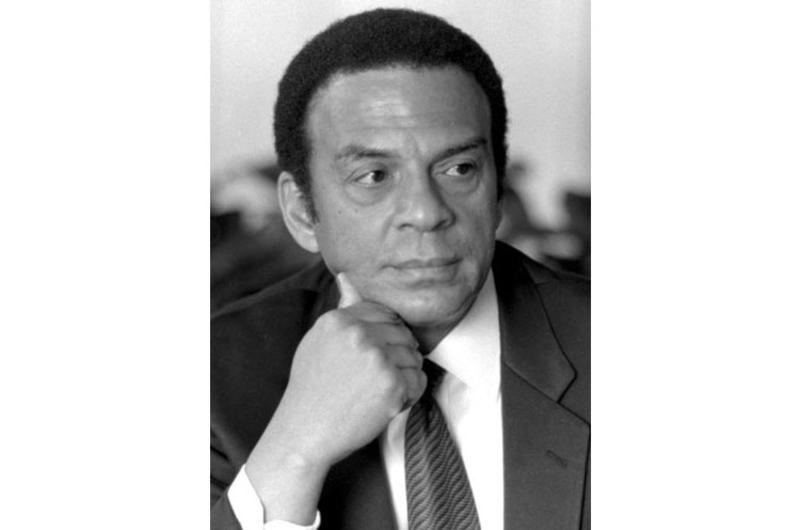Young backs hard line against S. Africa

Atlanta mayor, civil rights leader and former ambassador to the United Nations Andrew Young is interviewed during a visit to Tokyo with a Georgia trade delegation in September, 1986.
By HAL DRAKE | Stars and Stripes October 2, 1986
TOKYO — Atlanta Mayor Andrew Young said he believes that Congress will override President Reagan's veto of tough anti-apartheid sanctions on South Africa and force him to change his walk-soft policy toward Pretoria.
"I think the Senate and the House are going to override that," Young told Pacific Stars and Stripes Monday. "And I think that this will force him to take a new position."
The House vote Monday to pass the sanctions over the veto.
Young, in Tokyo with a Georgia state trade delegation, said sanctions are the only way to force South Africa to change its separatist racial policies. This is lost on Reagan, he said, because he never took part in American racial reform.
"I think President Reagan really never understood the process of social change that we went through in the United States," Young said. "You know, he lived in Hollywood but basically didn't do too much. They were fairly well isolated and lived in a fantasy world of movies. And I think that the struggle of breaking down racial barriers in the United States, he doesn't understand very well."
Young was once beaten unconscious at a whites-only lunch counter in Atlanta. It was mostly legal sanctions, applied by the federal government and the Supreme Court, however, that forced the segregated South to change, he said.
Once the veto is overturned, Young feels, Reagan will come around.
"I think this will force him to take a new position," Young said. "One thing about President Reagan — he has expressed a willingness and ability to change. And I still think, despite his opposition, he's one of the keys to helping to change South Africa. He and Margaret Thatcher."
The English prime minister has also opposed a hard line toward Pretoria.
Young was U.S. ambassador to the United Nations during the Carter administration, resigning in 1979 after an unauthorized meeting with a Palestine Liberation Organization representative. Such contacts were forbidden because the PLO refused to acknowledge Israel's right to exist.
Since Carter stepped out, Young said, there has been a "total degeneration" in the Middle East — increased terrorism and the expanded civil war in Lebanon.
"I mean," he said, "we have not moved anywhere since Camp David, and that's almost seven years now."
He can't fault his country for the chaos that followed, Young said, but "if we had done more to establish order in a peace process, we might have had some, enough influence in the region to keep some of the things that are happening from happening."
Young said this should have included a Palestinian presence at negotiations, or "at least giving Palestinians an opportunity to select their own negotiators."
"Whether they turn out to select PLO or not, you don't know. Nobody's ever let the Palestinians vote on anything."
Young said the black community in America "almost (has) to give" Japanese Prime Minister Yasuhiro Nakasone the benefit of the doubt on remarks he reportedly made last week about blacks and Hispanics.
Nakasone was quoted as saying that they were of inferior intellect but denied this, saying he meant that there were literacy problems among American minorities. He has since apologized for what he said was a misunderstood remark.
Young called it "an unfortunate statement that may well turn out to be fortunate, both for the Japanese and the U.S."
"I think that Japan, as a world leader, is going to have to become more sensitive to the diversity of the world," he said.
Young called the furor raised by the remark an opportunity for the Japanese to realize that it symbolizes "a kind of insensitivity" to the feelings of blacks and that this can be seen even in dealings with South Africa.
"You know, everybody saw that (South African Foreign Minister Roelof) Botha was here;" Young said, "and if we're taking American business out of South Africa and Japanese business is going to replace it, that's not going to bode too well for U.S. and Japan relationships.
Young's trip was to have included Peking, but he planned to leave for Atlanta late Tuesday.



